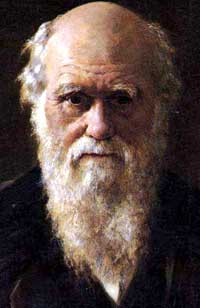07
A Natural Selection
Posted by jns on 7 December 2006 This week’s beard is worn by none other than Charles Darwin (12 February 1809 – 19 April 1882), the infamous, the reviled, the namesake of the dreaded Darwinism, author of On the Origin of Species by Means of Natural Selection.
This week’s beard is worn by none other than Charles Darwin (12 February 1809 – 19 April 1882), the infamous, the reviled, the namesake of the dreaded Darwinism, author of On the Origin of Species by Means of Natural Selection.
Quite without my really meaning for it to happen, the past month or more has been my Darwin month: I’ve been reading books with Darwin and Darwinism (or, perhaps more precisely, “post-synthesis neo-Darwinism”) as their themes, and it’s been a rewarding period of Darwinian immersion. The books in question are The Blind Watchmaker, by Richard Dawkins, Darwin’s Dangerous Idea, by Daniel Dennett, and “The Reluctant Mr. Darwin”, by David Quammen. The Dawkins is the only one I’ve finished so far — the others are in progress. Sometime after they’re all finished I expect I’ll write some Book Notes about them.
The Dawkins and the Dennett book both have very similar goals, namely, to elucidate the central idea of Darwinism* at some length to reduce the mystery, misunderstanding, and hostility that it engenders. They both do a good job in markedly different voices: Dawkins is a high-energy, exuberant acolyte, Dennett a more deliberate and philosophical adherent. Quammen’s book, it seems, intends to be an intellectual biography of how Darwin came to his theory about evolution and what happened when he finally arrived there; I’m still near the beginning but it promises to be a good trip.
In his introduction, Quammen touches on those famous polls by Gallup and the Pew Research Center that keeps finding that some 45% of the American people believe that “God created human beings pretty much in their present form at one time within the last 10,000 years or so”; only 13% agreed that humans have developed from other life forms without any intervention from God! He writes:
Maybe the polls are invalid. Maybe the numbers would be much different in England or Sweden or India. Maybe the same distinctly American mixture of skepticism and evangelicalism that led to the Scopes trial, in 1925, continues to animate many citizens who would simply rather take their biology from scripture than from science. Maybe the question of human evolution is misleading and inordinately touchy; maybe Gallup and Pew should be asking whether God created, let’s say, tree kangaroos in their present form. Or maybe … who knows? I don’t claim to have any definitive explanation for such an extreme level of skepticism and willful antipathy toward such a well-established scientific discovery. Frankly, it mystifies me. But certainly those Gallup results–combined with the continuing political offensive against teaching evolutionary biology in public schools–testify that Charles Darwin isn’t just perennially significant. He’s also urgently relevant to education and governance.
I have agree with Quammen when he says “Frankly, it mystifies me.” Although I didn’t do it because of Darwinism as such, or to fight specifically against creationist incursions, this mystification is certainly part of the reason I founded Ars Hermeneutica, Limited. Now, whether we’ll be able to understand or do anything about the problem is an entirely different animal, but we intend to try.
———-
*That species are not persistent and unchanging, but that species evolve from other species through the agency of natural selection.